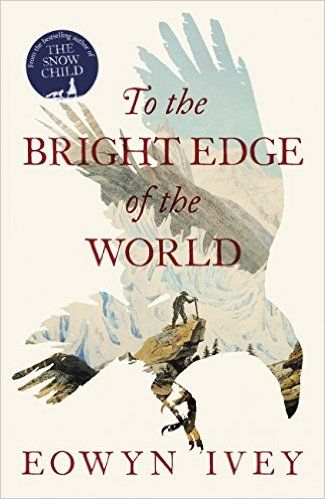
Before I begin my review of this book, I need to elicit a promise from you that you will read it when it comes out in August. Mainly because I am bereft it’s finished and I need to talk to someone about that. I am in mourning for the end of a novel. It happens sometimes, but it never gets easier.
Set in the spring and summer of 1885, the novel tells the stories of Lieutenant Colonel Allen Forrester and his wife, Sophie. He is sent on an expedition to track the Wolverine river through Alaska; pregnant Sophie is left behind at Vancouver Barracks. The narrative is told through a series of letters, diary entries, official reports and photographs. There are also letters and emails between Walt, a great-great nephew of the Forresters and Josh, a curator of a tiny Alaskan museum, who unravel the mystery of the Colonel’s journey.
I must admit that initially, I was reluctant- I had so loved The Snow Child, Ivey’s previous novel, and I wasn’t sure what I’d make of a novel about a man tracking through Alaska. But a couple of things won me over. First, look at the cover for the ARC:

I mean, isn’t that beautiful? I won’t be lending this copy out to people, I can tell you that. I’ll be like Gollum with his precious.
Secondly, I fell in love with the characters. Sophie fascinated me and her quiet rejection of the stifling society of ladies in which she finds herself made me like her enormously. She survives worry and heartache and tragedy- and she finds a shockingly modern way (to the aforementioned ladies, at least) to cope by taking up photography. The scenes in which she is aided and abetted by Charlotte, the little maid, are some of my favourite scenes. Sophie is a genteel rebel in a world that is just as harsh and inhospitable to women as the wilds of Alaska are to her husband and his rag-tag band of men.
And speaking of the men, I was surprised at how much I found myself enjoying the novel when it went back to them travelling up the river. Alaska seems like it was a brutal country and the novel does not shy away from that. The men were hardened soldiers (in one case traumatically so) and were used to hardship- but even that did not save all of them from their journey. But this is not a story of machismo and brutality, but one of endurance and fortitude. These men have to band together in order to survive and make sense of their experiences.
As well as the diaries allowing the reader to get a sense of the harshness of the wilderness, it also allows us to get a sense of history- there are many incidents with indigenous people in the novel and this is an interesting and sensitive topic. The group is joined by a fearless native woman, Nat’aggi and her dog, and they meet many tribes on their journey. The Colonel, while respectful, is clearly a product of his age. He doesn’t understand the people he meets and there is a sense that he sees them as ‘other’; Nat’aagi baffles him, although he clearly respects her. There is a lovely exchange between him and a tyone (leader) of one of the tribes, but he is a man on a mission who just wants to get home.
I found the exchanges between Josh and Walt pull the debates about identity and indigenous people into a more modern focus, which I enjoyed. The two men make unlikely friends, brought together by a history that is shared yet distant, and I felt that they really act almost as translators of two sides of history.
Another thing I enjoyed about this novel is that it sent me away to do my own research. I have a friend, Millie, who is Alaskan and descended from the Alutiiq people- she has very generously answered many questions I have about Alaska and its native tribes as a result of the book. For me, a good historical story will send me away on a research mission in order to better understand what I’ve just read. It’s part of the pleasure of reading historical fiction- a good yarn should be well researched, which in turn leads the reader onto their own research (I don’t want to say ‘journey’, as it sounds a bit… X Factor).
If you follow me on Twitter, you’ll know that I’ve been tipping this to be nominated for prize lists. I cant say exactly what it is that leads me to make such a bold claim, but I’m certain of it. The last novel that I felt so powerfully about was A God in Ruins. Eowyn Ivey clearly loves her subject matter and it shows. She is a wonderful, wonderful writer and I wish I could ask her lots of questions about it.
I want you to read this book. And then I want you to come and talk to me about it.
Wow, you make a great case for this book. I’m not one for yearny romance type books but as long as this steers clear of that, I think I will like it. Who is the rep — maybe I can review as well? Then we can talk about it before August. 🙂
LikeLike
In the UK, it’s Katie Brown at Tinder Press. It’s definitely not a yearny romance- I’m also not a fan of those!
LikeLike
I am so excited for this book! I loved “The Snow Child” as well. Glad to hear that this one is great as well!
LikeLike